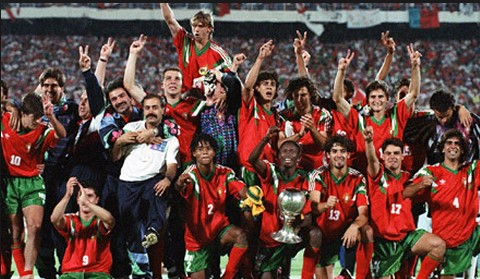 The first ever FIFA U20 World Cup (then called the FIFA World Youth Championship) took place in 1977. Two years later Portugal made their debut in the tournament, and one decade later they would win two successive titles under the expert guidance of coach Carlos Queiroz together with the sumptuous talent of the famed “golden generation”.
The first ever FIFA U20 World Cup (then called the FIFA World Youth Championship) took place in 1977. Two years later Portugal made their debut in the tournament, and one decade later they would win two successive titles under the expert guidance of coach Carlos Queiroz together with the sumptuous talent of the famed “golden generation”.
The competitions staged in the far-off host countries of Qatar and Colombia also hold happy memories for the U20 national team, however, Portugal have had more than their fair share of heartbreaks. The Seleção were eliminated in the 94th minute against Argentina in the 1979 quarter-finals and in the 90th minute against Brazil in the 1995 semi-finals and Ghana scored an 85th minute winner to eliminate Portugal in 2013 in the round of 16. That's not to mention three eliminations in penalty shootouts.
PortuGOAL takes you through the roller-coaster ride of all of Portugal’s campaigns at the FIFA U20 World Cup, highlighting the players who went on to have long and distinguished careers for club and country and those who failed to fulfil their early potential.
1979 FIFA World Youth Championship - Japan
Portugal’s debut in the tournament came in the second edition of the competition. They were drawn in Group C alongside Paraguay, South Korea and Canada. The Seleção got off to the worst possible start, a 3-1 defeat against Canada had Peres Bandeira’s side up against it, but a 1-0 win against Paraguay and a 0-0 draw against South Korea saw Portugal progress to the knockouts due to a one-goal advantage over the Asian nation.
Uruguay were the quarter-final opponents at the Yokohama International Stadium, the match seemingly destined for extra time at 0-0 before Uruguay’s Rubén Paz scored a 94th-minute winner. Argentina would go on to lift the trophy with Diego Maradona winning the Golden Ball award.
Results
Canada 3-1 Portugal (group stage)
Portugal 1-0 Paraguay (group stage)
Portugal 0-0 South Korea (group stage)
Uruguay 1-0 Portugal (quarter-final)
Class of 1979
One player’s career towers over all others from the 1979 squad. Diamantino Manuel Fernandes Miranda, known simply as Diamantino, was an attacking midfielder who made his name at Benfica in two separate spells spanning 11 seasons. He clocked up more than 300 official matches for the Eagles, winning the league on four occasions and the Portuguese Cup five times. He was also a key player of the senior Seleção side in the 1980s, playing a starring role in the 1984 Euro and 1986 World Cup. After retiring, he stayed involved in the game as a coach and a TV pundit.
Goalkeeper Zé Beto was another member of Portugal’s first U20 World Cup campaign who went on to have a notable career, playing for FC Porto for a decade. His life was tragically cut short at 29 in a road accident.
1989 FIFA World Youth Championship - Saudi Arabia
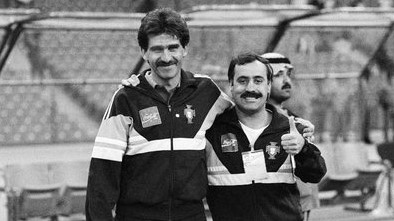 It would be 10 years before Portugal returned to the tournament, but they made it count in the best possible fashion by lifting the trophy. Portugal began by beating Czechoslovakia 1-0 with an 88th-minute strike by Paulo Alves and secured a 1-0 win against Nigeria with João Vieira Pinto scoring the winner in the 79th minute.
It would be 10 years before Portugal returned to the tournament, but they made it count in the best possible fashion by lifting the trophy. Portugal began by beating Czechoslovakia 1-0 with an 88th-minute strike by Paulo Alves and secured a 1-0 win against Nigeria with João Vieira Pinto scoring the winner in the 79th minute.
Carlos Queiroz’s side were not at the races in the final Group A match against hosts Saudi Arabia, beaten 3-0 but still finished top of Group A. Jorge Couto scored in the 1-0 quarter-final win against Colombia to set up a semi-final clash against Brazil at the Prince Abdullah al-Faisal Stadium.
Amaral was the hero in a 1-0 win in Jeddah with Portugal facing a rematch against Nigeria in the final. Portugal emerged victorious again in front of 65,000 in Riyadh, a 2-0 win getting it done with Abel Silva and Jorge Couto on target.
Results
Czechoslovakia 0-1 Portugal (group stage)
Nigeria 0-1 Portugal (group stage)
Saudi Arabia 3-0 Portugal (group stage)
Portugal 1-0 Colombia (quarter-final)
Portugal 1-0 Brazil (semi-final)
Class of 1989
Three massive names belonging to Portugal’s famed “golden generation” who went on to construct stellar careers were in Queiroz’s pioneering squad: Paulo Sousa, Fernando Couto and João Vieira Pinto.
Paulo Sousa’s trophy-laden career includes the unusual feat of winning the biggest prize in club football, the UEFA Champions League, in two successive years for two different clubs. The holding midfielder helped guide Juventus to European glory in 1995-96, then starred as Borussia Dortmund were crowned kings of Europe 12 months later, ironically beating his former club Juventus in the final. Sousa won a total of 10 major trophies at club level, and despite his career effectively ending in his late twenties due to recurring injury problems, he played 52 times for the senior Portugal side.
Like Sousa, Fernando Couto enjoyed a fabulous career. Although his lengthy career is known mainly for his time outside Portugal, his four years as a regular at Porto were enough to win him 3 league titles, 3 Portuguese Cups and 2 Super Cups. After tasting success at FC Porto, he went on to shine in Italy and Spain, representing Parma (twice), Barcelona and Lazio, winning a European trophy at each of these three clubs (Cup Winners’ Cup at Barça and Lazio, UEFA Cup at Parma), accumulating a remarkable total of 22 domestic trophies. Couto amassed 110 caps for the senior Portugal side.
In contrast to the above duo, João Vieira Pinto stayed in Portugal practically his entire career, yet nobody disputes his place among the famed “golden generation” after providing brilliant service at Boavista, Benfica and Sporting, winning a total of 9 trophies at the three clubs. A slippery, speedy, and fiery character, he played a major role at helping both Lisbon giants to championship victories. JV Pinto earned 81 senior caps for Portugal, scoring 23 goals.
Other players from the 1989 U20 Seleção squad who had distinguished domestic careers include forwards Paulo Alves, António Folha and Jorge Couto and defender Paulo Madeira.
1991 FIFA World Youth Championship - Portugal
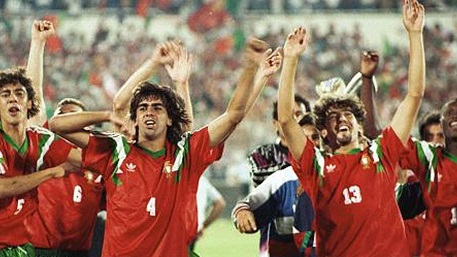 Portugal hosted the 1991 tournament and successfully defended their title under Carlos Queiroz. They breezed through Group A by beating Republic of Ireland 2-0 courtesy of João Vieira Pinto and Nuno Capucho, Argentina 3-0 with goals to Gil Gomes, Paulo Torres and Toni, Torres on target once again in a 1-0 win against South Korea.
Portugal hosted the 1991 tournament and successfully defended their title under Carlos Queiroz. They breezed through Group A by beating Republic of Ireland 2-0 courtesy of João Vieira Pinto and Nuno Capucho, Argentina 3-0 with goals to Gil Gomes, Paulo Torres and Toni, Torres on target once again in a 1-0 win against South Korea.
The knockout rounds were hard work but Portugal kept on winning. Paulo Torres scored the first goal against Mexico, the match going to extra time where Toni scored in a 2-1 win. Rui Costa was on target in the semi-finals in a 1-0 win against Australia with Brazil waiting in the final at the Estádio da Luz.
The match was goalless after extra time with a penalty shootout required. Jorge Costa, Luís Figo, Paulo Torres and Rui Costa were all on target in a historic victory with many players becoming household names after successful club and senior Portugal team careers.
Results
Portugal 2-0 Republic of Ireland (group stage)
Portugal 3-0 Argentina (group stage)
Portugal 1-0 South Korea (group stage)
Portugal 2-1 Mexico (quarter-final)
Portugal 1-0 Australia (semi-final)
Portugal 0-0 Brazil (final) Portugal win on penalties
Class of 1991
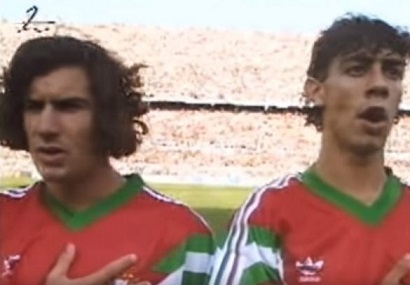 The winning squad of 1989 contained several historical names of Portuguese football, and it was no different in 1991 as two more legendary players helped the Seleção to success: Luís Figo and Rui Costa, undoubtedly two of Portugal’s all-time greats. With Figo and Costa alongside players of the calibre of Jorge Costa, Nuno Capucho and Emílio Peixe, not to mention João Pinto Vieira in the squad again, perhaps it was not surprising Portugal triumphed on home soil. This was truly a golden generation.
The winning squad of 1989 contained several historical names of Portuguese football, and it was no different in 1991 as two more legendary players helped the Seleção to success: Luís Figo and Rui Costa, undoubtedly two of Portugal’s all-time greats. With Figo and Costa alongside players of the calibre of Jorge Costa, Nuno Capucho and Emílio Peixe, not to mention João Pinto Vieira in the squad again, perhaps it was not surprising Portugal triumphed on home soil. This was truly a golden generation.
Luís Figo racked up goals, assists, plaudits and a stack of silverware in a glittering career at Sporting, Barcelona, Real Madrid and Inter Milan. He won an amazing 23 major trophies at club level and was named FIFA World Player of the Year in 2000. After shining brightly at Sporting, Figo became a huge hit in Catalonia, helping Barça to two La Liga titles, two Copa del Reyes and glory in Europe (UEFA Cup Winners’ Cup and European Super Cup), yet he left under a cloud after a sensational transfer to arch rivals Real Madrid. His time in the Spanish capital brought another two La Liga victories and the coveted UEFA Champions League in 2002. For the full national team Figo was a long-serving captain and amassed 127 caps for Portugal, a record only bettered by Cristiano Ronaldo.
Rui Costa, known as the Prince of Florence, was a midfield maestro who wooed football fans all over the world with his flamboyance, elegance and class. He became a huge favourite at his home-town club Benfica and then Fiorentina, but won his biggest trophy – the UEFA Champions League – at AC Milan. After playing a major role in helping Portugal win the 1991 U20 FIFA World Cup, he would go on to play 94 times for the senior Seleção, scoring 26 goals.
Jorge Costa went on to become an FC Porto legend as an uncompromising centre-back. He won the Portuguese league eight times in an era of complete domestic dominance by the Dragons, and would go on to captain José Mourinho’s famous Porto side to glory in the UEFA Cup and UEFA Champions League in successive seasons.
During the early part of his career at Porto, Costa’s success was shared by Nuno Capucho – another member of Portugal’s U20 World Cup winning team of 1991. Capucho did not start any of the World Cup games but came on as a substitute in five of the six games, including all the knockout phase matches.
Emílio Peixe received the golden boot award for the MVP at the tournament, but despite going on to represent Portugal’s big three in Sporting CP, FC Porto and Benfica, Peixe’s senior career never hit the heights it promised. Special mention should also be given to Abel Xavier, one of the most colourful characters in Portuguese football history whose club career would take in a remarkable 12 clubs in eight different countries.
1993 FIFA World Youth Championship - Australia
After dominating the World Youth Championship for four years, Portugal were brought back down to earth in 1993 with an early exit. The Seleção were aiming for three in a row in Australia but would go home empty handed after a disastrous campaign.
Agostinho Oliveira’s side lost 1-0 against Germany and 2-1 to Uruguay after conceding in the 87th minute. A miserable tournament was completed by a 2-0 defeat against Ghana.
Results
Portugal 0-1 Germany (group stage)
Portugal 1-2 Uruguay (group stage)
Portugal 0-2 Ghana (group stage)
Class of 1993
In marked contrast to the 1991 squad, which was packed with players who would go on to have exceptional careers, just two years down the line and it was a very different story. Portugal’s poor showing at the tournament is reflected in the fact that few of the squad went on to taste meaningful success in the beautiful game.
The one exception is centre-back Litos, who was one of the bedrocks and captain of Boavista when they stunned the Portuguese football world by winning the league in 2000-2001. Litos went on to play several seasons for Malaga in La Liga.
1995 FIFA World Youth Championship - Qatar
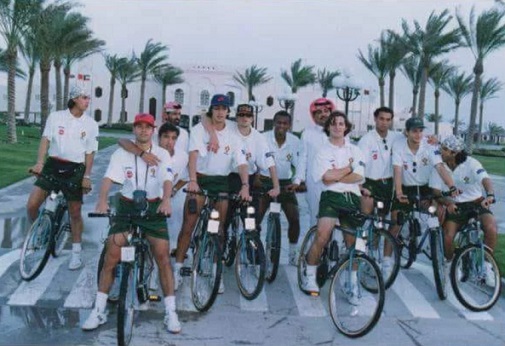 Portugal bounced back in Qatar by winning all three Group C matches to advance to the knockout rounds. A Nuno Gomes brace and a Dani strike secured a 3-2 win against Honduras but the Sporting midfielder was just getting started. Dani scored again in the 1-0 win against Argentina and was on target alongside Beto and Agostinho in the 3-0 win against Netherlands.
Portugal bounced back in Qatar by winning all three Group C matches to advance to the knockout rounds. A Nuno Gomes brace and a Dani strike secured a 3-2 win against Honduras but the Sporting midfielder was just getting started. Dani scored again in the 1-0 win against Argentina and was on target alongside Beto and Agostinho in the 3-0 win against Netherlands.
Nelo Vingada’s side then scraped past Australia 2-1 in extra time courtesy of Agostinho to set up another meeting with Brazil in the semi-finals. It wasn’t to be this time, Portugal falling to a heartbreaking 1-0 defeat as Caio scored in the 90th minute at the Khalifa International Stadium in Doha.
There was a consolation prize however, Portugal defeating Spain 3-2 in the match for third place with a Nuno Gomes brace and another Dani strike enough to overcome a 2-0 half time deficit.
Results
Portugal 3-2 Honduras (group stage)
Portugal 1-0 Argentina (group stage)
Portugal 3-0 Netherlands (group stage)
Portugal 2-1 Australia (quarter-final)
Portugal 0-1 Brazil (semi-final)
Portugal 3-2 Spain (3rd/4th place match)
Class of 1995
Goalkeeper Quim would go on to appear in 396 Primeira Liga matches for Braga, Benfica and Aves. He won two Primeira Liga and Taça da Liga titles with Benfica, one Taça da Liga with Braga and a Taça de Portugal with Aves in his final professional match. Quim earned 32 caps for Portugal’s senior side.
Striker Nuno Gomes continued at Boavista where he won the 1996-97 Taça de Portugal before earning a move to Benfica. He was a prolific striker for the Eagles and moved to Fiorentina where he won the Coppa Italia. His Italian venture didn’t last long however, and he returned to Benfica where he won two Primeira Liga titles (2004-05, 2009-10), one Taça de Portugal (2003-04) and three Taça da Liga’s (2008-09, 2009-10, 2010-11). Nuno Gomes was Primeira Liga Player of the Year twice (1998-99, 1999-2000) and appeared in 79 senior internationals where he racked up 29 goals.
Centre-back Beto would have a distinguished career at Sporting, playing for over a decade at the Lisbon giants, captaining the club and lifting the Portuguese title twice. He earned 31 caps for the senior Portugal team, playing in the 2002 World Cup and was selected in the Euro 2000 and Euro 2004 squads.
Dani appeared to have the world at his feet after the tournament in Qatar. He was awarded second place in the Golden Boot and Golden Ball awards that helped him earn a loan move from Sporting to West Ham. He scored on his Hammers debut at White Hart Lane in a 1-0 win over Tottenham but quickly fell out with manager Harry Redknapp. He spent three seasons at Ajax Amsterdam, returning to Lisbon for a very brief spell at Benfica before moving to Spanish Segunda division club Atlético Madrid. Dani earned nine caps for Portugal but fell out of love with the game, retiring in 2004 aged 27 to focus on his TV career.
1999 FIFA World Youth Championship - Nigeria
Portugal didn’t qualify for Malaysia 1997 but were back two years later in Nigeria under Jesualdo Ferreira. South Korea were defeated 3-1 in the opening match with Ricardo Sousa and a Simão Sabrosa brace getting it done, but that would be their only victory.
Paulo Costa scored in a 2-1 defeat against Mali before a 0-0 draw against Uruguay saw Portugal limp into the Round of 16. That’s where it would end, Marco Claudio scoring an equaliser against Japan to take the match to a penalty shootout, Paulo Costa missing a crucial spot kick with the Blue Samurai progressing.
Results
Portugal 3-1 South Korea (group stage)
Portugal 1-2 Mali (group stage)
Portugal 0-0 Uruguay (group stage)
Portugal 1-1 Japan (round of 16) Japan win on penalties
Class of 1999
One name jumps out from Portugal’s 1999 U20 World Cup squad: Simão Sabrosa. The free-scoring winger and deadly free-kick taker played for Sporting CP, Barcelona, Benfica and Atlético Madrid where he won the 2009-10 UEFA Europa League. Spells at Beşiktaş and Espanyol followed before ending his career at NorthEast United in the Indian Super League.
Simão scored 22 goals in 85 matches for Portugal’s senior side, appearing in two World Cups and two European Championships including the Euro 2004 runners-up and 2006 World Cup semi-finalists.
Marco Caneira’s club career is also worth flagging up, the central defender playing for clubs all over Europe including spells at Sporting, Inter Milan, Benfica, Bordeaux and Valencia.
2007 FIFA U20 World Cup - Canada
Portugal’s Canadian expedition started well but quickly went downhill. Bruno Gama bagged a brace in the opening 2-0 victory over New Zealand but Jose Couceiro’s side then lost 2-1 against Mexico and Gambia.
They qualified for the Round of 16 as one of the best third-placed teams, but it only prolonged the pain as Portugal were outplayed by Chile in a 1-0 defeat.
Results
Portugal 2-0 New Zealand (group stage)
Portugal 1-2 Mexico (group stage)
Portugal 1-2 Gambia (group stage)
Portugal 0-1 Chile (round of 16)
Class of 2007
Goalkeeper Rui Patrício stayed with Sporting CP for more than a decade, amassing 460 games for the Lions before moving to Wolverhampton Wanderers in 2018. Patrício made his senior national team debut in 2010 and made the position his own, playing every minute in Portugal’s successful 2016 UEFA European Championship campaign. He currently has 81 caps, making him the goalkeeper with the most appearances for the Seleção, and looks certain to reach a century.
Fábio Coentrão went from hometown club Rio Ave to Benfica before Real Madrid paid the Eagles €30 million for the left sided player in 2011. When fully fit Coentrão was magnificent, such as at World Cup 2010 when many analysts made him the best left-back at the tournament. Unfortunately, injuries took a heavy toll on his career, leading to an exit from Real Madrid and loan spells at Monaco and Sporting followed by a return to Rio Ave in 2018. He amassed 52 caps for Portugal’s senior side.
Another left-back in the squad, Vitorino Antunes, has also enjoyed a notable career, having played in Italy, Greece, Spain and Russia, and can perhaps count himself unlucky to have only obtained 13 senior caps for Portugal, partly due to his FIFA U20 World Cup 2007 team-mate Coentrão.
Portugal’s biggest star at this tournament was talented attacker Bruno Gama, who scored twice in the opening match, but in a meandering career he failed to fully realise his early potential, playing his best football in Spain for Deportivo La Coruña.
2011 FIFA U20 World Cup - Colombia
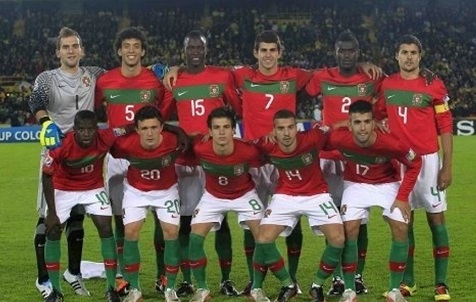 Portugal began their Colombian campaign with a 0-0 draw against Uruguay before Nélson Oliveira’s strike secured a 1-0 win over Cameroon. Mario Rui grew into the tournament and scored in the 1-0 win against New Zealand as Ilídio Vale’s side advanced to the Round of 16.
Portugal began their Colombian campaign with a 0-0 draw against Uruguay before Nélson Oliveira’s strike secured a 1-0 win over Cameroon. Mario Rui grew into the tournament and scored in the 1-0 win against New Zealand as Ilídio Vale’s side advanced to the Round of 16.
A Nélson Oliveira penalty was enough in a 1-0 win against Guatemala, then Argentina were taken all the way to extra time in the quarter-finals with victory assured in a penalty shootout. France were the semi-final opponents in Medellin, Portugal riding their luck and emerging victorious thanks to Danilo Pereira’s early goal and another Nélson Oliveira penalty.
Familiar opponents Brazil were standing in Portugal’s way in the final at the Estadio Nemesio Camacho El Campin in Bogota. Goals from Alex and Nélson Oliveira put Portugal 2-1 up, but they couldn’t stop Oscar who completed his hat-trick in extra time to claim another title for the Samba Boys.
Results
Portugal 0-0 Uruguay (group stage)
Portugal 1-0 Cameroon (group stage)
Portugal 1-0 New Zealand (group stage)
Portugal 1-0 Guatemala (round of 16)
Portugal 0-0 Argentina (quarter-final) Portugal wins on penalties
Portugal 2-0 France (semi-final)
Class of 2011
Mário Rui moved to Italy in 2011 with the left-back playing for Parma, Empoli and Roma before finding a home at Napoli. Considered a late bloomer, Rui made his senior debut in March 2018 but failed to get off the bench at the 2018 FIFA World Cup. He has earned just eight caps for the senior side to date.
Cedric Soares made his name at Sporting before Southampton snapped him up. The right-back made his senior debut in 2014 and was an ever-present in the knockout rounds as Portugal won the 2016 UEFA European Championship. Soares’ last international appearance came in October 2018, his 33rd cap as he fell behind Nélson Semedo and João Cancelo in the pecking order.
Starting out in Benfica’s youth ranks, Danilo Pereira wasn’t signed by the Lisbon giants as a youngster, instead moving to Parma with loan spells in Greece and Netherlands at Aris Thessaloniki and Roda. He returned to Portugal, playing two strong seasons at Marítimo with FC Porto recognising his talent and snapping him up in 2015 for just €4.5 million. A towering presence in central midfield, he has ample time to add to his 32 senior caps.
Much was expected of Nélson Oliveira but he hasn’t hit the heights many expected. Benfica loaned him to Rio Ave, Paços de Ferreira, Deportivo La Coruña, Rennes, Swansea City and Nottingham Forest before Norwich City signed the striker in 2016. He is unlikely to add to his 17 senior caps.
Attacking midfielder Sérgio Oliveira is another player who generated high expectations, but despite impressing in flashes he has failed to nail down a place in FC Porto’s team, spending almost the entirety of his career thus far on loan at other clubs. On one such loan, in 2018-19, he helped PAOK to a historic triumph in the Greek Super League.
2013 FIFA U20 World Cup - Turkey
Looking at the quality of the 2013 squad, this has to go down as the FIFA U20 World Cup, along with the 2019 edition, where Portugal most underachieved. Goals were flowing for the Seleção in the group stage, beginning with a 3-2 win against Nigeria with striker Aladje opening the scoring and Bruma bagging a brace. Both players were on target in the 2-2 draw against South Korea before a crushing 5-0 win against Cuba.
Ricardo Pereira, Aladje, another Bruma brace and Tozé got the goals as Edgar Borges’s youngsters cruised into the knockout rounds. Despite dominating Ghana and going 2-1 up through Tiago Ferreira and Edgar Ié, a late capitulation resulted in a disappointing Round of 16 exit at the Kadir Has Stadium.
Results
Portugal 3-2 Nigeria (group stage)
Portugal 2-2 South Korea (group stage)
Portugal 5-0 Cuba (group stage)
Portugal 2-3 Ghana (round of 16)
Class of 2013
João Cancelo remained at Benfica where he was sold to Valencia in 2015 for €15 million and then to Juventus in 2018 for €40 million. A right-back equally adept at playing further forward, Cancelo forced his way into the senior side in 2016 and appears set to add to his 14 caps.
Ricardo Pereira established himself at Vitória Guimarães, earning a move to Porto before two productive seasons on loan at Nice. A return to Porto followed where an excellent season led the cash-strapped club to sell Pereira to Leicester City in 2018 for €22 million, with the defender enjoying a fabulous debut season and being named the club’s player of the season in two separate votes by the fans and by his team-mates. The right-sided player has five caps to his name and faces stiff competition from the likes of João Cancelo and Nélson Semedo, but his ability to play in midfield or on the wing could still help his international career.
Goalkeeper José Sá spent another three seasons at Marítimo before being signed by FC Porto. He failed to establish himself at the Estádio do Dragão and was sold to Olympiakos in 2019 for €2.5 million. Edgar Ié was a promising youngster who moved to FC Barcelona B a year earlier in 2012. Ié was given a chance by Lille in 2017 but he couldn’t make it count and was loaned to FC Nantes for the second half of the 2018-19 season.
Bruma forced a move from Sporting to Galatasaray after the tournament, finding himself on loan at Real Sociedad and Gaziantepspor before a successful 2016-17 season at Galatasaray saw RB Leipzig sign Bruma in 2017 for €15 million. It didn’t work out well in the Bundesliga, Leipzig recouping their €15 million as PSV Eindhoven signed the winger in July 2019. Bruma looks unlikely to add to his seven senior caps.
João Mário moved on loan from Sporting to Vitória Setúbal in January 2014, but he returned to the Estádio José Alvalade where he was outstanding in central midfield. A regular in the 2016 UEFA European Championship winning squad, Inter Milan paid Sporting €40 million for Mário after the tournament but his career stalled despite a reasonable loan spell at West Ham. A former Fernando Santos favourite, he has been on the outside of the senior squad after earning 43 caps.
André Gomes spent another season at Benfica before a year on loan at Valencia that was made permanent in 2015 for €20 million. FC Barcelona splashed €37 million on Gomes the following season where his career went into freefall. A season on loan at Everton went some way to rebuilding his career with the Toffees making the move permanent for €25 million in July 2019. Gomes could find it tough to add to his 29 senior caps.
2015 FIFA U20 World Cup - New Zealand
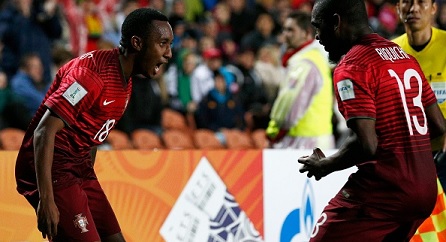 Portugal were fantastic in Group A with three convincing wins resulting in 10 goals scored and just one conceded. Gelson Martins, André Silva and Nuno Santos scored in the 3-0 win against Senegal before goals from Silva, Ivo Rodrigues (2) and Vigário earned Portugal a 4-0 win against Qatar.
Portugal were fantastic in Group A with three convincing wins resulting in 10 goals scored and just one conceded. Gelson Martins, André Silva and Nuno Santos scored in the 3-0 win against Senegal before goals from Silva, Ivo Rodrigues (2) and Vigário earned Portugal a 4-0 win against Qatar.
Nuno Santos opened the scoring against Colombia with André Silva scoring his third and fourth goals of the tournament to wrap up a 3-1 win. Raphael Guzzo got the ball rolling in the 2-1 win against New Zealand in the Round of 16 as Gelson Martins scored a late winner.
Portugal’s nemesis were waiting in the quarter-finals, Brazil coming out on top in a penalty shootout after the match ended 0-0 following extra time. Hélio Sousa’s side were bitterly disappointed, but a handful of players would soon be counting their cash after commanding huge transfer fees and significantly increasing their weekly wage.
Results
Portugal 3-0 Senegal (group stage)
Portugal 4-0 Qatar (group stage)
Portugal 3-1 Colombia (group stage)
Portugal 2-1 New Zealand (round of 16)
Portugal 0-0 Brazil (quarter-final) Brazil wins on penalties
Class of 2015
Gonçalo Guedes spent another two seasons at Benfica before Paris Saint-Germain paid the Eagles €30 million in 2017 for the then 20-year-old. He found it tough in Paris but succeeded on loan at Valencia, the La Liga club making the deal permanent in 2018 for €40 million. Guedes scored the winner against Netherlands in the 2019 UEFA Nations League Final at the Estádio do Dragão, his third goal in his 16th cap.
Rony Lopes was snapped up by Manchester City from Benfica’s U17 squad for just €1 million in 2015. He was sold to Monaco for €12 million following the U20 World Cup and spent a season and a half on loan at Lille before returning to Monaco in June 2017. Despite flashes of excellence, his career has been badly marred by injuries.
Exclusive video interviews as Portugal’s U20 World Cup preparations continue apace
André Silva remained at FC Porto for another season before AC Milan signed the striker for €38 million. It didn’t work out in Serie A, and after a promising start a loan spell at Sevilla ended up falling flat and he lost his place in the national team. With 15 goals in 33 caps to his name, the 2019-20 season will be crucial for Silva as he attempts to get back to the top level.
Gelson Martins jumped at the chance to leave Sporting amid the 2018 crisis with Atlético Madrid paying a €22.5 million fee. He couldn’t force his way into the starting XI under Diego Simeone and was loaned to Monaco in January 2019, the principality side making the deal permanent for €30 million in July 2019.
2017 FIFA U20 World Cup - South Korea
Emílio Peixe took charge in South Korea as Portugal scraped into the knockout rounds. A 2-1 defeat against Zambia was a bad start with Hélder Ferreira’s 91st-minute goal a mere consolation. Diogo Gonçalves scored a penalty in the 1-1 draw against Costa Rica and he was on target again with the equaliser against Iran, Portugal requiring an 86th-minute own goal to secure a 2-1 win and qualification to the round of 16.
Hosts South Korea were the opponents with Bruno Xadas scoring a brace either side of a Bruno Costa strike as Portugal won 3-1, their campaign seemingly back on track. It would end in the quarter-finals against Uruguay however, Bruno Xadas providing two assists for Xande Silva and Diogo Gonçalves as the match went into extra time tied at 2-2. Another spot kick exit would be Portugal’s third failure in a penalty shootout, and second successive elimination by that method in consecutive tournaments.
Results
Portugal 1-2 Zambia (group stage)
Portugal 1-1 Costa Rica (group stage)
Portugal 2-1 Iran (group stage)
Portugal 3-1 South Korea (round of 16)
Portugal 2-2 Uruguay (quarter-final) Uruguay wins on penalties
Class of 2017
Rúben Dias was the main success story to come out of the 2017 squad, immediately promoted to Benfica’s senior squad and playing 24 matches in the 2017-18 Primeira Liga season. He earned his first Portugal senior cap in a friendly against Tunisia in March 2018, but failed to feature at the 2018 World Cup. However, having become an automatic starter at Benfica where he helped the Eagles become Portuguese champions in 2018-19, he also became a regular for the Seleção in central defence next to Pepe and is likely to be a mainstay for Portugal for the next decade.
Right-back Diogo Dalot had to wait another eight months to get promoted from Porto’s B squad to the Dragons’ senior squad, but just a handful of matches at senior level for his club was enough to persuade Manchester United to shell out €22 million for his signature in July 2018.
The Benfica trio of central defender Ferro and midfielders Gedson Fernandes and Florentino have all accumulated substantial experience for Benfica’s first team, helping the Eagles win the 2018-19 Portuguese title. Bruno Xadas and Xande Silva, two stars of Portugal’s showing in South Korea, have not made a big impact at club level as of yet.
2019 FIFA U20 World Cup - Poland
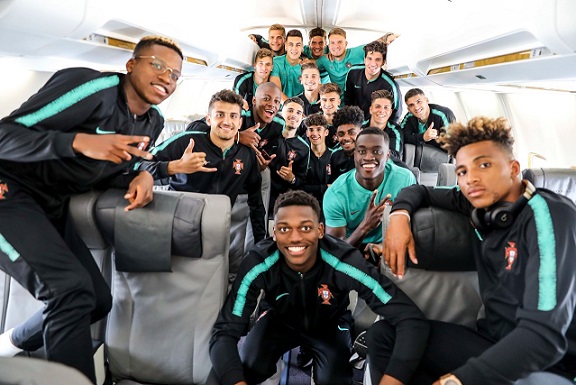 Hélio Sousa was back in charge in 2019 as Portugal went into the U20 World Cup with big expectations. Sousa had guided much of the squad to victory in the 2016 UEFA U17 European Championships and 2018 UEFA U19 European Championships but they would crash out in the group stage.
Hélio Sousa was back in charge in 2019 as Portugal went into the U20 World Cup with big expectations. Sousa had guided much of the squad to victory in the 2016 UEFA U17 European Championships and 2018 UEFA U19 European Championships but they would crash out in the group stage.
Francisco Trincão scored an early winner in a 1-0 victory against Korea Republic, but they wasted a number of chances in a 2-0 defeat against Argentina. A win or a high scoring draw was required against South Africa in their final group match, but despite taking the lead through Rafael Leão and dominating the match, a conceded penalty and failure from the spot resulted in a 1-1 draw and a heartbreaking exit.
Results
Portugal 1-0 Korea Republic (group stage)
Portugal 0-2 Argentina (group stage)
Portugal 1-1 South Africa (group stage)
Class of 2019
It’s way too early to judge the class of 2019, but there are some interesting prospects that have every chance of going on to become important players at club and international level. Diogo Dalot, Gedson Fernandes, Florentino Luís and Miguel Luís were all part of the 2017 squad and have featured for the senior Manchester United, Benfica and Sporting CP teams.
Diogo Dalot was underwhelming in Poland but still has plenty of time to improve. Gedson Fernandes earned two senior Portugal caps off the bench in friendlies in late 2018, but hasn’t progressed as well as many expected and has a questionable attitude.
Florentino Luís looks to have a bright future and will be a player to watch in the coming years. Central defenders Diogo Leite and Diogo Queirós could break through at Porto, wingers Francisco Trincão and João Filipe ‘Jota’ have plenty of skill and will be pushing for first team spots at Braga and Benfica. Left-back Rúben Vinagre is on the books at English Premier League club Wolverhampton Wanderers and will hope for more playing time.
Sporting CP striker Rafael Leão was snapped up on a free transfer by Lille in August 2018 and scored eight goals in Ligue 1 during the 2018-19 season. He is reportedly being targeted by Everton and Roma and could earn the French side a healthy profit.
By Matthew Marshall & Tom Kundert
[First published on 19 July 2019. This article is part of the "The PortuGOAL files" series and will be updated on a regular basis]
Portugal’s FIFA U20 World Cup history
| 2019 Poland | Group Stage |
| 2017 South Korea | Quarter-finals |
| 2015 New Zealand | Quarter-finals |
| 2013 Turkey | Round of 16 |
| 2011 Colombia | Runners-up |
| 2007 Canada | Round of 16 |
| 1999 Nigeria | Round of 16 |
| 1995 Qatar | 3rd place |
| 1993 Australia | Group Stage |
| 1991 Portugal | Winners |
| 1989 Saudi Arabia | Winners |
| 1979 Japan | Quarter-finals |

